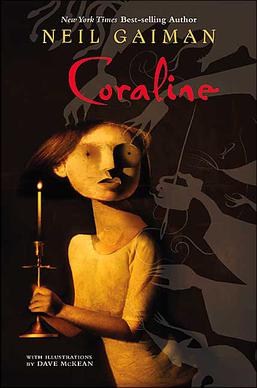“Coraline,” a dark fantasy novella by Neil Gaiman, has captivated readers and viewers with its eerie atmosphere and gripping storyline. As fans delve deeper into the story, many wonder if there’s any truth behind the chilling tale of a young girl who discovers an alternate reality through a secret door in her new home.
The plot thickens as Coraline navigates this parallel world, encountering twisted versions of her parents and other bizarre characters. With its unsettling themes and mysterious ending, it’s no surprise that “Coraline” leaves audiences questioning the true nature of its origins and seeking clarity on its conclusion.
Understanding Coraline: Fiction or Reality?
Neil Gaiman’s novella “Coraline” blurs the line between fiction and reality, captivating audiences with its dark fantasy elements.
Exploring the Origins of Coraline
Neil Gaiman published “Coraline” in 2002. He drew inspiration from classic fairy tales and horror stories. The character Coraline Jones was partly inspired by his own daughter, Holly. Gaiman aimed to create a modern fairy tale that would resonate with both children and adults.
Is Coraline Based on a True Story?
“Coraline” is not based on a true story. It is purely a work of fiction crafted by Neil Gaiman’s imagination. While it contains relatable themes like family dynamics and childhood fears, no real-life events or individuals directly influenced the plot or characters.
The Plot of Coraline Explained
Neil Gaiman’s “Coraline” follows the adventures of a young girl who discovers an alternate reality. This dark fantasy novella explores themes of bravery, identity, and family.
The Mysterious Other World
Coraline Jones moves into a new home with her parents. She discovers a small door that leads to an alternate universe mirroring her own world but with sinister differences. In this other world, she meets the Other Mother and Other Father, who initially seem more attentive and caring than her real parents. However, Coraline soon realizes that this world is a trap designed to keep her forever.
- Coraline Jones: The protagonist who embodies curiosity and courage.
- Other Mother: A malevolent entity representing false promises.
- Other Father: A puppet controlled by the Other Mother.
- Real Parents: Represent neglect but genuine love.
- Wybie Lovat: A friend who aids Coraline in both worlds.
These characters highlight various facets of human relationships and personal growth within the eerie narrative framework.
Decoding the Ending of Coraline
The ending of “Coraline” leaves many viewers pondering its deeper meanings and implications. Neil Gaiman’s story concludes with a mix of resolution and lingering questions, making it a rich subject for analysis.
What Does the Ending Mean?
In the final scenes, Coraline defeats the Other Mother by outsmarting her in a game to rescue her real parents and three ghost children. She locks the door to the alternate reality, ensuring that the Other Mother can’t escape. This victory symbolizes Coraline’s growth from a curious child into a brave individual who confronts her fears. The return to normalcy signifies that despite facing dark challenges, one can restore balance through courage and intelligence.
Symbolism in the Conclusion
The key elements in “Coraline’s” conclusion carry significant symbolism:
- The Key: Represents control over one’s destiny. By securing it, Coraline takes charge of her life.
- The Garden: Transforms from eerie to vibrant, symbolizing renewal and hope after overcoming adversity.
- Buttons vs Eyes: Buttons sewn over eyes signify loss of individuality and autonomy; defeating this threat restores true vision and self-awareness.
These symbols reinforce themes of empowerment, resilience, and personal growth within Gaiman’s narrative framework.
Conclusion
Neil Gaiman’s “Coraline” masterfully intertwines dark fantasy with profound themes of personal growth and empowerment. The story’s rich symbolism, from the key to the garden transformation, underscores Coraline’s journey toward bravery and self-discovery. By defeating the Other Mother, Coraline not only secures her freedom but also gains control over her destiny. This narrative serves as a powerful reminder of resilience and courage in the face of adversity, making “Coraline” a timeless tale that resonates deeply with readers of all ages.

